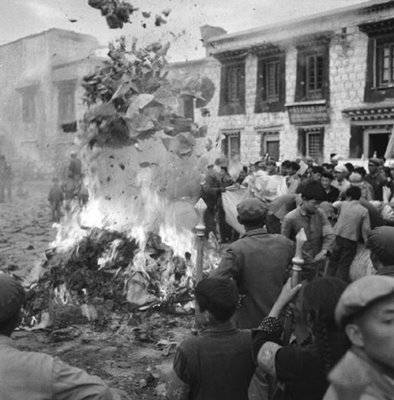The world knows of China's censorship of media. They censor all types of mediums including television, print media, radio, film, theater, text messaging, instant messaging, video games, literature and the Internet. A wide variety of subject matter is censored by the government: politics, cultural, moral, religious, & economic.
Anything that can essentially tarnish the government's reputation with topics ranging from independence of the people to corruption and anarchism is censored. Pornography and some religious texts, publications, and materials are also banned.
*Since our unit is focused around printed culture, I will of course focus on the censorship on literature in China.China has a state run agency that is in charge of controlling and screening every type of literature that will be sold in the open market, the General Administration of Press and Publication (GAPP). The GAPP has the legal right and authority to screen, censor, and ban any print, electronic, or Internet publication in China.
All publishers must also be approved and licensed by the GAPP, which means that it also has the right to deny the people to publish. They can also completely shut down a publisher if they fail to follow as dictated. What results from this is the ratio of official to pirated books is about 40%::60%.
The government can actually still hold public book burnings for unapproved books. Interestingly, these books that have been the victim of these book burnings have been reprinted in English and distributed in Western Cultures.
Here's a list of China's Best Banned Books.
There's something about having the status of 'Banned' that makes it much more desirable. The whole "you want what you can't have" phenomenon.
Is China's approach to this censorship really getting accomplished what it wants? Like when your parents tell you that you can't have that one cookie. While you wanted before, now you REALLY want it just because your parents say you can't. I once devised a scheme where the result was the cookie fell on the floor so my parents would say I could have it so the cookie wouldn't go to waste. With censorship, there will always be people that find a way around the censors and bans. It's just like the marijuana debate here in the U.S.
Does government censorship actually censor anything?


Interesting post Shuan! I thought the statistic about the official to pirated book ration was especially telling. I agree with your point that often times not being "allowed" to have something makes us want it that much more. I would also agree that people will usually find a way to access the information they want so that makes censorship a waste of time and government resources. I'm not sure how taxes work in China, but just imagine how much revenue they could bring in if they legalized and taxed the books that are on the black market!
ReplyDeleteGovernment's trying to control and ban things usually doesn't stop people. We can look at the US with prohibition. Prohibition didn't stop people from drinking alcohol all it did in the long run was make it so that an underground trade system developed.
ReplyDeleteBut then, these underground trade systems do provide jobs...
ReplyDeleteMaybe that's the big scheme of things after all. Provide jobs through any means possible, even it's illegal.